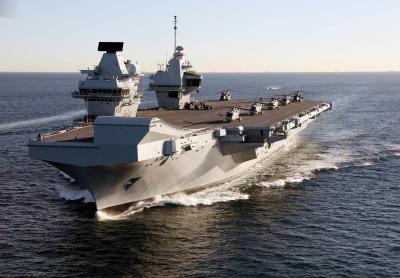Insider View: Gunboat diplomacy

ROME - The images of the HMS Queen Elizabeth arriving at the Sicilian port of Syracuse this month flanked by an imposing Carrier Strike Group fleet was a reminder, as the aircraft carrier’s captain, Angus Essenhigh said, of the close ties between our two navies. The UK and Italy are NATO partners, engaged in security in the Mediterranean and beyond.
The ship left Portsmouth on May 22 and is heading through the Middle East towards the Pacific where the Carrier Strike Group will take part in the Bersama Lima exercises to commemorate the 50th anniversary of the Five Power Defence Agreements, signed in 1971 between the UK, Australia, New Zealand, Singapore and Malaysia. The deployment will climax Britain’s efforts to claim a role as a major power in the far east after Brexit and as a valuable partner in Western efforts to curb what is seen as Chinese expansionism.
The stopover in Sicily recalls also for historians how the Royal Navy 160 years ago played a key role in the Risorgimento when a British gunboat protected the 1000 volunteers led by Giuseppe Garibaldi as they landed in Sicily to battle Bourbon troops. While Britain previously had supported the Kingdom of the Two Sicilies with Horatio Nelson coming to the rescue of the King of Naples when the Bourbon monarch put down a rebellion in 1848, the British Empire by 1860 had decided the southern kingdom was a lost cause.
Despite the background of excellent relations today, however, the aftermath of Brexit has caused some friction between Rome and London, with Italian citizens arriving in the UK without visas being held incognito in detention centres, leading to protests from the Italian Foreign Ministry, the Farnesina.
The British Ambassador moved quickly to reassure the Italian Government that such unfortunate incidents will not be repeated. Nevertheless in the wake of the border hiccups the Farnesina and the Italian Consulate in London have often evidently turned a blind eye to the plight of British students struggling to obtain visas to travel to Italy for language studies, many of them from the last batch of British Erasmus scholars before the UK left the exchange scheme.
Our re-publication of an article from the Italian Insider 10 years ago in this issue is a reminder that education has been a source of frustration between the UK and Italy in the past as British and other foreign lecturers working as lettori at Italian universities have been discriminated against by unscrupulous rectors.
Like the last British Erasmus students many of the lettori who devoted their professional careers to lecturing to Italian students are fading away, often facing hardship due to miniscule or non-existent pensions despite the valiant efforts of their ALLSI trade union. Without representation in Strasbourg, British lecturers are more vulnerable than ever.
Military cooperation between Italy and the UK is worth considerable sums in defence contracts to both countries, most notably in the Tempest programme.
The days when the Royal Navy dispatched gunboats to protect the rights of individual Britons are past and the future of small British enclaves such as the Falklands and Gibralter is uncertain.
The downside of Realpolitik also has been manifest in Italy’s failure to bring Egypt to task for the shameful murder of Cambridge student Giulio Regeni.
While governments work hard to promote lucrative defence deals, it seems ordinary citizens’ rights too often get given a low priority.
jp-ol


